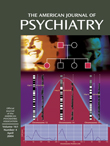Psychopathology Risk Transmission in Children of Parents With Substance Use Disorders
Abstract
OBJECTIVE: Children of fathers with substance use disorders are at increased risk for psychopathology, including conduct disorder, attention deficit hyperactivity disorder (ADHD), major depressive disorder, and anxiety disorders. This study examined the distinct influences of parent substance use disorder and other psychopathology in the transmission of the risk for psychopathology to their children. METHOD: The subjects were 1,167 children (ages 6–14 years; 62% were male, 38% were female) from 613 families recruited according to a high-risk paradigm. Of these families, 294 had fathers with a substance use disorder (high-risk group), and 319 had fathers without a substance use disorder or other mental disorder (low-risk group). In all families, father, mother, and children were directly assessed. Mixed-effects ordinal regression analyses controlled for the nested data structure. RESULTS: For conduct disorder, ADHD, major depression, and anxiety disorders, the results indicated that the predominant predictor of specific mental disorders in offspring was a history of the corresponding disorders in both parents. CONCLUSIONS: These results support specific parent-child transmission for childhood psychopathology.



